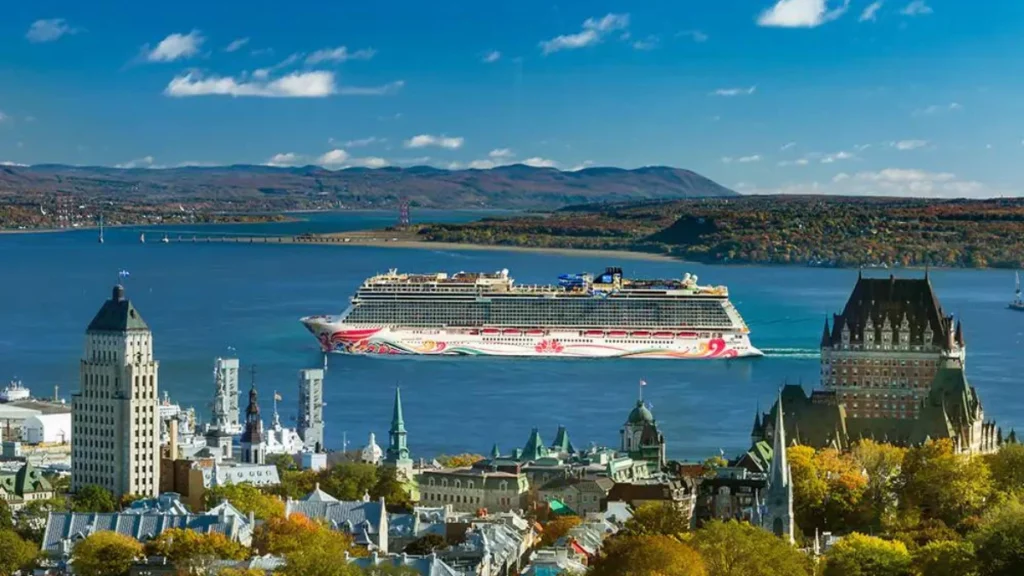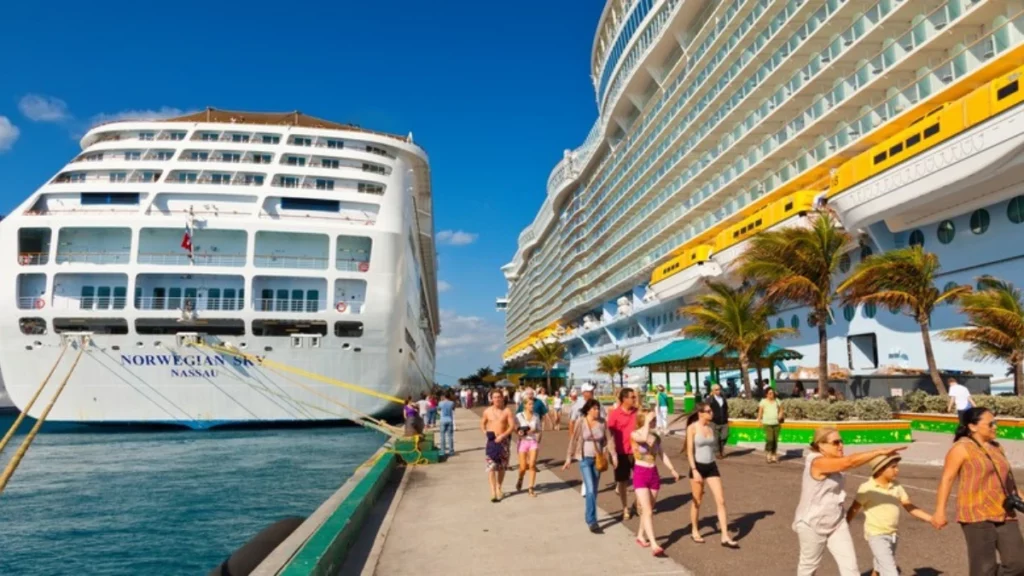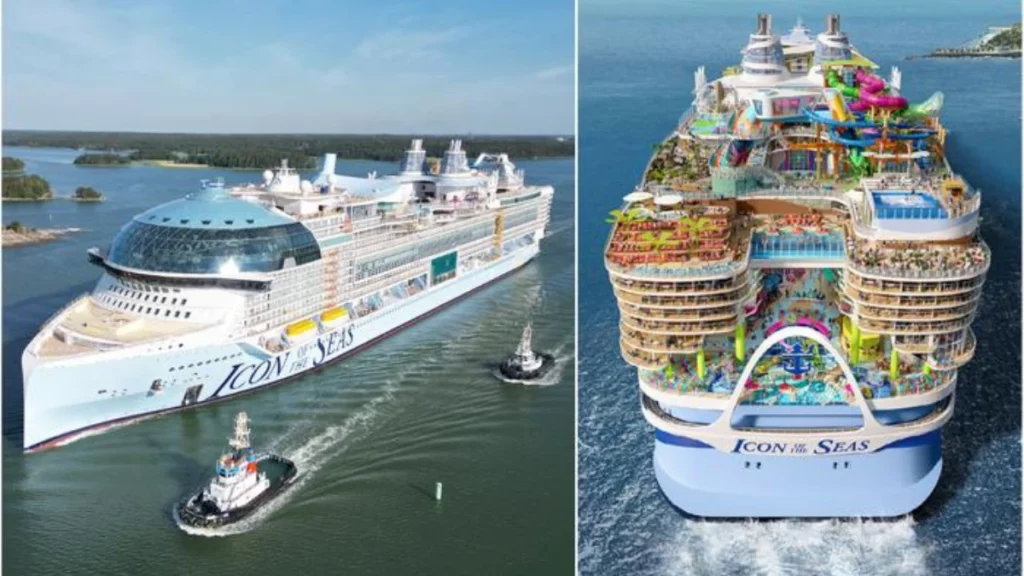Experience the perfect blend of history, culture, and natural beauty with the New England and Canada cruises.
These cruises offer travelers the chance to witness the region’s breathtaking fall foliage as vibrant autumn hues transform the landscape into a living postcard.
What makes these voyages truly special is the opportunity to explore both American and Canadian culture in a single trip, with visits to iconic destinations like Boston, Halifax, and Quebec City, each offering its own unique charm.
Read our comprehensive guide to Canada and New England cruises, including details on costs, top cruise lines, ideal travel times, and must-see ports to ensure a memorable adventure at sea.

Best time for Canada and New England cruise

The cruise season for New England and Canada runs from May to October, fall being the most popular time. The weather changes drastically through the year, affecting everything from your comfort onboard to the activities you can enjoy. For example, if you want to see the famous fall foliage, travel in September or October when the natural colors are at their best. But summer is perfect for shore excursions and activities. Choosing the right time is key to making the most of your trip.
What to pack for Canada and New England cruise?

Given the limited space in cruise cabins and baggage weight restrictions, thoughtful preparation is essential as you pack for your New England and Canada cruise. The temperatures can vary widely, with cooler mornings, warm afternoons, and chilly nights, especially between September and October. Rainy and windy days are common, too, so packing essential clothing and non-clothing items smartly is key to staying comfortable and prepared.
Canada and New England shore excursions

The Canada and New England cruise offers a wide range of shore excursions, from guided tours of charming little towns and historic cities to curated experiences that help you immerse yourself in the local culture. You can stroll through the cobblestone streets of Quebec City, visit the iconic lighthouses of Maine, or enjoy the fresh seafood in Nova Scotia. With so many unique options, choosing the perfect shore excursion needs careful consideration.
Select your favorite Canada and New England cruise experience

Popular cruises to Canada and New England
The New England and Canada region features nearly 5,000 miles of coastline, with breathtaking views of rocky shores, sandy beaches, and historic attractions. It’s stunning to explore by cruise, considering the photogenic backdrop, especially when the foliage peaks. Many popular cruise lines, such as Royal Caribbean and Princess Cruises, sail between this northeastern seaboard route, taking passengers to well-known destinations like Boston, Quebec City, and more. Selecting the right cruise for your interests is essential for an enjoyable holiday.
Ports in Canada and New England
Halifax
Nova Scotia
Bar Harbor
Portland
Prince Edward Island
Frequently asked questions
Where will I go on a New England cruise?
You visit charming ports like Boston, Bar Harbor, and Newport. Many cruises also take you to Canadian cities like Halifax and Saint John. You’ll see historic sites, beautiful coastlines, and quaint towns, all while enjoying local seafood and unique shops.
Do you need a passport to cruise New England and Canada?
Yes, you must carry a valid passport. Both the U.S. and Canadian governments require it for international travel, even if the cruise starts and ends at a U.S. port. Having your passport ensures you are prepared for unexpected travel changes or emergencies.
Which side of the ship is the best for a New England cruise?
There isn’t a strict rule about which side is better, but many travelers prefer the starboard side (right) when sailing north, as it often provides better coast views. On the way back south, the port side (left) offers similar coastal views. In any case, the scenery is stunning from various spots around the ship, including the upper decks.
How much should I budget for a New England and Canada cruise?
Budgeting for a New England cruise depends on the cruise line, length of trip, and cabin choice. A 7-day trip can range from $1,200 to $5,000 per person. Don’t forget to account for extras like excursions, drinks, tips, and souvenirs. Setting aside $500 to $1,000 for these extras will keep you covered.
Why are New England cruises so expensive?
New England cruises cost more because of their seasonal demand and limited cruise time during fall. People love seeing the vibrant autumn colors, and that increases the demand. The unique, smaller ports and the historic charm of New England add to the experience, making it a premium destination compared to others.
What are the best cruise ports in New England and Canada?
Boston, Bar Harbor, Portland, and Newport are the top cruise ports in New England. Halifax, Saint John, and Quebec City are must-visit ports in Canada. These places offer rich history, scenic beauty, and a range of activities, from exploring charming towns to visiting cultural landmarks.
When is the best time to take a New England cruise?
The best time for a New England cruise is from late September to October. During this period, you’ll enjoy the fall foliage and pleasant weather. Early summer, from June to August, is also great for exploring but without the colorful leaves. The cruise season generally runs from May through October.
What do I wear on a New England cruise?
Pack layers for a New England cruise. The weather can change, so bring a light jacket, sweater, and comfortable clothes for exploring. You’ll need casual outfits during the day and semi-formal or formal wear for evenings. Don’t forget comfortable walking shoes, as many excursions involve exploring on foot.
What shore excursions are available on a New England and Canada cruise?
Shore excursions on a New England and Canada cruise include sightseeing tours, whale watching, and exploring historic sites. You can visit charming towns like Bar Harbor, enjoy lobster feasts, or hike national parks like Acadia. In Canada, you can explore Quebec City’s Old Town, visit Halifax’s Citadel, or enjoy the stunning views at Peggy’s Cove.
How long is the average New England and Canada cruise?
The average New England and Canada cruise lasts between 7 to 14 days. This gives you enough time to explore several ports and experience both countries’ unique landscapes, cultures, and histories. Shorter 5-day cruises and up to 30 days options are also available, depending on how much time you want to spend.
What are the popular cruise lines offering trips to New England and Canada?
Popular cruise lines offering trips to New England and Canada include the Royal Caribbean, Norwegian Cruise Line, and Holland America. These lines are known for their scenic routes, especially during the fall. Princess Cruises, Celebrity Cruises, and Carnival also offer options with different amenities, catering to families, couples, and luxury travelers.
What are the dos and don’ts of a New England and Canada cruise?
Respect local customs and the environment. Dress in layers, as the weather can change quickly. Don’t miss the ship’s departure times or overpack. Keep track of your personal belongings and avoid large, crowded areas. Also, don’t forget to try the local cuisine, like fresh seafood and regional dishes.
Is travel insurance necessary for a New England and Canada cruise?
Yes, it’s a good idea to get travel insurance. It helps cover unexpected events, like trip cancellations, medical emergencies, or lost luggage. Cruises can involve long travel distances, and weather or health issues could affect your plans. Having insurance can give you peace of mind during your trip.
What currency is used in New England and Canada, and should I bring cash?
In New England, you’ll use U.S. dollars, while in Canada, Canadian dollars are the currency. Most places accept credit cards, but it’s a good idea to carry some cash for small purchases, tips or in areas where cards might not be accepted, especially in remote or smaller towns.
What should I do if something goes wrong during my cruise?
If something goes wrong, notify the cruise staff immediately. They are trained to handle issues from medical emergencies to lost items. For serious problems, like missing the ship at a port, contact the cruise line’s local office or your travel insurance provider for help getting back on track.
